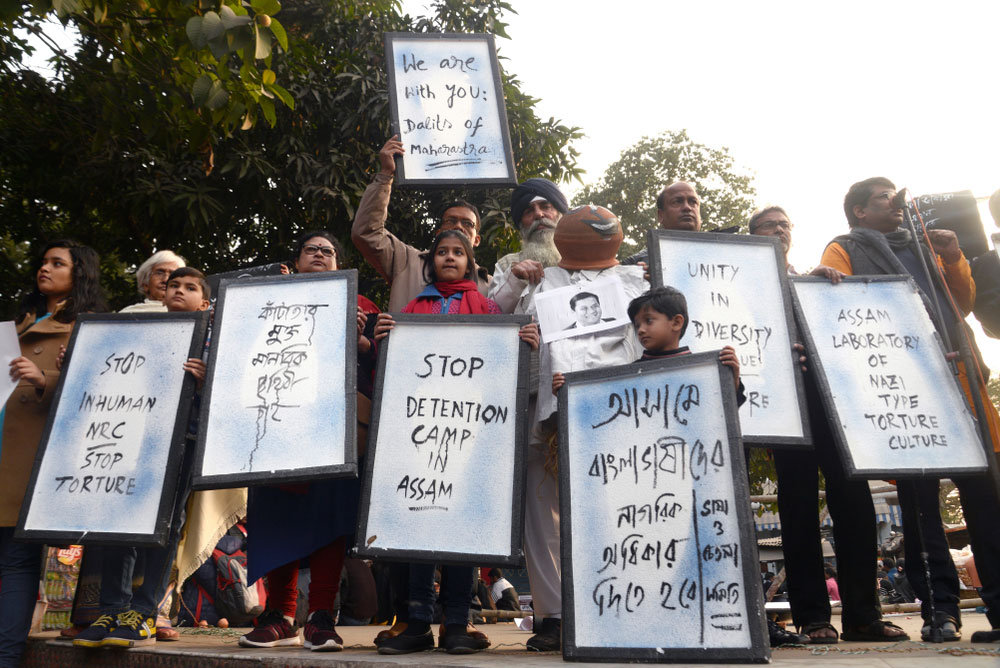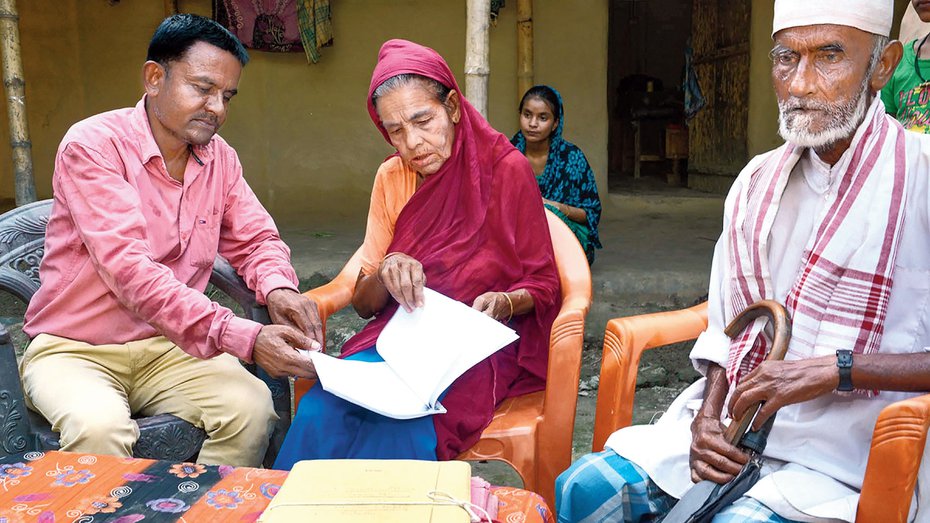Shake your chains to earth like dew
Which in sleep had fallen on you
Ye are many — they are few
The Masque of Anarchy composed by P.B. Shelley in 1819 was in protest against the Peterloo Massacre in England wherein many were killed while demanding reform of parliamentary representation. In time, the poet was lauded for advocating non-violence as a means of resistance.
Two hundred years on, a group of poets in Assam is expressing angst against the dogged persecution of Muslims of Bengali origin in the northeastern state against the backdrop of the National Register of Citizens (NRC) churn. Unlike Shelley, however, the appreciation will take a while coming. For now, they are left battling the “anti-Assamese” tag for their literary attempts.
The Miya poets are so named after the pejorative “miya”, commonly used in Assam to describe Muslims of Bengali origin in the geography. “Mother, you detest me for who I am/ Dropped into your lap as a cursed Miya,” writes one. Yet another writes: “How much blood should I lose to get my rights?” And another: “The land that makes my father alien, riddles my brother with bullets, gang-rapes my sister.” The compositions are in Assamese. Many also write in English and Hindi. All of them agree that the chosen language of expression is not important, the content is.
The final list of the NRC was released on August 31. The number of people excluded equals 19 lakh and this includes a large number of Bengali Hindus. Post the publication of the list, Shalim M. Hussain, a Delhi-based researcher, writer and Miya poet, said that Miya poetry had been validated by the exclusion count. He tells The Telegraph, “It has shown that the Miyas have been stigmatised as outsiders and foreigners for no reason.”
One of the dominant images of Miya poetry is the sunburnt back of the working-class miya, mistaken for an illegal immigrant who has crossed the barbed wires of the border. Says Shalim, “There are Miya poets who, despite having the requisite documentation, have been excluded from the supplementary list.”
On July 10, Pranabjit Doloi, a former journalist with a local television channel, filed a police complaint against some of these poets — Shalim Hussain, Rehna Sultana, Ashraful Hussain, Abdur Rahim, Kazi Sharowar Hussain, Hafiz Ahmed — and others, who he said supported them on social media platforms by hosting videos of their readings.
Doloi blamed the “accused” — including Karwan-e-Mohabbat, a peace-building initiative by activists and journalists — of circulating “radical” Miya poetry. He said, “In Assam, there is no such community called Miya. There is no Miya dialect. I am not against Miya poetry, but against the subject that the poets chose. In one of the poems, a poet has written about brothers being shot and sisters being gang-raped. Will an Assamese man commit gang rape? Their intentions are to demean the Assamese community globally.”
Two days after Doloi’s FIR, multiple FIRs were filed against Miya poets by the general secretary of the Assam BJP’s minority cell (Changsari unit), the Goriya Moriya Deshi Parishad (Bongaigaon unit) and the Uzani Asom Muslim Kalyan Parishad, a self-proclaimed representative of Assamese Muslims based in upper Assam.
The genre of Miya poetry gained prominence after Ahmed’s poem Write down I am Miya was posted on Facebook in 2016. Ahmed wrote: “My serial number in the NRC is 200543. I have two children. Another is coming next summer. Will you hate him as you hate me?” The poem was inspired by Palestinian poet Mahmoud Darwish’s 1964 composition, Identity Card. (Darwish’s poem was punctuated by the famous line: “Write down: I am an Arab.”)
Ahmed’s poem found a place in the 2017 book, India Dissents: 3,000 Years of Difference, Doubt and Argument, compiled by Sahitya Akademi awardee Ashok Vajpeyi. Inspired by the poem, many Assamese Muslims began to share their personal experiences of being victims of prejudice and persecution in their own home state.
“Miya poetry also focuses on various social problems such as illiteracy, poverty, population explosion prevailing in the Char Chapori (an area of the Brahmaputra basin),” clarifies Ahmed, who is the president of the Char Chapori Sahitya Parishad. He continues, “The question of citizenship is a burning problem for the people of this community. Since Independence, the community has been harassed in the name of citizenship. They have been suspected to be Pakistanis, and then Bangladeshis. When the NRC process began, I was not worried about myself or my family but about the poor and illiterate who are unaware of the process.” The literary body is currently trying to help as many people as possible through writings, workshops, meetings and other gatherings.
The entire Miya poetry discourse remains a worrisome factor for some. Dilip Borah, a senior professor at Gauhati University, claims the entire discourse smacks of the handiwork of “outside” elements. Says Borah, “Most of the poets are young and are based outside Assam. They don’t know the facts. They claim they are Assamese but, at the same time, they want to assert their Miya identity. They do not represent Assam’s Muslim community.”
Another detractor, Gauhati High Court advocate Shantanu Borthakur, says, “I oppose the content of the poems but not the poetry. The content relays that they want to assert Miya identity. Anything against the greater Assamese identity cannot be accepted.” Former Sahitya Akademi awardee Hiren Gohain also criticised these poets.
In August, Rehna Sultana was hounded for a two-year-old social media post wherein she had commented on a matter completely unrelated to the NRC — Virat Kohli’s exit in a cricket match against Pakistan. On August 16, Assam police registered a case against her. She was also charged under Section 153A of the IPC (promoting enmity) and Section 67 of the IT Act (publishing a defamatory post).
Despite roadblocks and allegations, Miya poetry continues to roll down like water and indignation like an ever-flowing stream. Abdul Kalam Azad, a researcher and one of the 10 accused in Doloi’s FIR, says, “Decades were spent speculating how many ‘Bangladeshis’ are taking shelter in Assam. The number ranged from 50 lakh to even a crore-and-a-half. The supplementary list itself has busted those myths.”
Activist and poet Ashraful Hussain says, “We stand vindicated, nevertheless, 1.9 million is a big number.” His new poem reads thus: “When our poems strike their hearts/They scream so loudly it’s as if/Their pain is greater than ours/ Should we remain silent then/ Or let their high voltage drama/ Stifle the fires in our heart?/ Should we let go of the thread that binds/ Our century-old heritage?” He has titled it In the Name of my Dead Mother.












